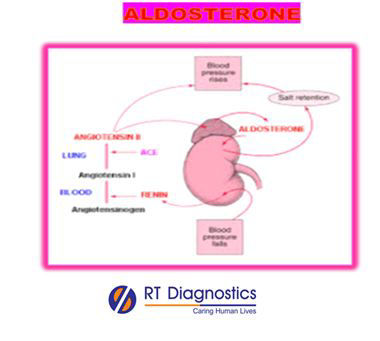ALDOSTERONE (Serum):
CLINICAL INFORMATION :
Serum Aldosterone is most often used to help diagnose primary and secondary aldosteronism (a disordered condition that causes adrenals to secrete high levels of aldosterone e.g. tumors of the adrenals) or few causes that result in disorder that produces less aldosterone due to primary adrenal insufficiency causing general loss of adrenal function that results in increased potassium levels and causing low blood pressure and lethargy.
Aldosterone test and renin test are ordered to perform when the patient has high blood pressure, especially when the patient has low potassium levels, and moreover in cases when a patient does not respond to blood pressure medications and/or if hypertension develops at an early age.
Aldosterone is controlled by the renin-angiotensin system (while the rest of adrenal glands’ hormone production is controlled by ACTH i.e. adreno-corticotropic hormone). The physiological function of aldosterone is to balance sodium and potassium levels. But when aldosterone levels are high then high sodium levels are retained (sodium reabsorption by kidneys) and excessive excretion of potassium occurs. Thus this imbalance results in retaining high water retention in the body thereby increasing the blood volume and resulting in high blood pressure and reduced urine output.
Causes of hyperaldosteronism are primary hyperaldosteronism (e.g tumors of adrenals), and secondary hyperaldosteronism (i.e. blockage or narrowing of the renal artery), chronic liver disease, heart failure, left ventricular hypertrophy, cardiac fibrosis, diuretic medications, etc. symptoms include upper body obesity (apple-shaped pattern), skin in the abdomen or underarm with reddish-blue streaks, high BP, muscle and bone weakness, moodiness, irritability, increase anxiety and also results along with mental depression, high blood sugar levels and slow growth rates in children.
Adrenal insufficiency is a condition where the adrenals do not produce adequate amounts of steroid hormones (primarily cortisol) and may secrete impaired levels of aldosterone (mineralocorticoid – regulates sodium conservation, potassium secretion, and water retention). During adrenal insufficiency, therein reduced cortisol synthesis with stress leading to Addison's disease or crisis. It is a life-threatening situation with low BP and low blood glucose and high levels of potassium. Symptoms include fatigue, body aches, unexplained weight loss, low BP, light-headedness, loss of body hair, skin discoloration (hyperpigmentation), etc. Usual tests for adrenal insufficiency are the ACTH stimulation test, insulin tolerance test, CRH stimulation test, Antibody tests, CT-scan and MRI, tests for TB, etc.

General Instructions:
Sample Requirement: Specimen - Blood sample drawn from the vein or urine specimen. Test Preparation: None.
NOTE - Sample for specimen collections may vary based on the patient’s condition/cases according to the patient’s presentingcomplaints / signs or symptoms:
SPECIMEN REQUIREMENT (Special or Rare Cases) - As instructed and guided by Physician / Clinician / Pathologist / as per Laboratory’s requirements, according to procedures and protocols.
This Multi-Specialty Clinical Referral Laboratory “RTDIAGNOSTICS” provides precise and accurate tests with an extensive range of testing services to the medical centers to help in the diagnosis and identification of pathology in the test specimens for infectious diseases and also to evaluate the function of organ systems of the patient. It prevents further complications and helps to stabilize and restore health to near normalcy at the earliest without delay.



